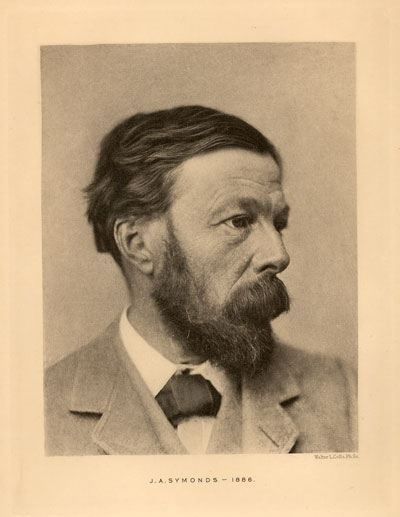Difference between revisions of "Wilson Collection: John Addington Symonds"
(John Addington Symonds) |
(John Addington Symonds) |
||
| (5 intermediate revisions by the same user not shown) | |||
| Line 2: | Line 2: | ||
''(Frontis portrait of John Addington Symonds from volume one (of a two volume set) of John Addington Symonds: A Biography: Compiled from His Papers and Correspondence by Horatio F. Brown; London: John C. Nimmo, 1895)'' | ''(Frontis portrait of John Addington Symonds from volume one (of a two volume set) of John Addington Symonds: A Biography: Compiled from His Papers and Correspondence by Horatio F. Brown; London: John C. Nimmo, 1895)'' | ||
| − | |||
| − | |||
'''John Addington Symonds''' | '''John Addington Symonds''' | ||
| − | For nineteen years John Addington Symonds unsuccessfully pressed Walt Whitman to give an explicit definition of “the dear love comrades.”[ | + | For nineteen years John Addington Symonds unsuccessfully pressed Walt Whitman to give an explicit definition of “the dear love comrades.”<ref>Jonathan Katz, ''Gay American History: Lesbians and Gay Men in the U.S.A.'' (New York: Thomas Y. Crowell, 1976), 341, 351.</ref> |
| + | |||
| + | The Englishman authored ''A Problem in Greek Ethics'' (published 1883), an important early defense of homosexuality.<ref>Katz, 343.</ref> In ''A Problem in Modern Ethics'' (1891) he urged homosexual law reform and used the phrase “homosexual instincts.”<ref>Vanessa Baird, ''The No-Nonsense Guide to Sexual Diversity'' (Oxford: New Internationalist Publications, Ltd. 2007), 26, accessed October 19, 2012, http://books.google.com/books?id=jJr8Yt54TeAC&pg=PA26&lpg=PA26&dq=%22homosexual+instincts%22+problem+in+modern+ethics&source=bl&ots=gBENA8VsJE&sig=-PvV3zO3SX-8ae8lx1JKNXu-p6Y&hl=en&sa=X&ei=el7vT7muFuqS6wHgyqSfBg&ved=0CD8Q6AEwAQ#v=onepage&q=instincts&f=false.</ref> It was the first English-language in-print use of the word “homosexual.”<ref>Baird, 26.</ref> | ||
| + | |||
| + | Symonds was an esteemed scholar of Renaissance Italy. He revealed that Michelangelo's grand-nephew feminized the pronouns in the painter's love poems. The censorship occurred because, according to the grand nephew's margin-note, the verses originally expressed “amor...virile” (masculine love).<ref>Rictor Norton, ''The Myth of the Modern Homosexual: Queer History and the Search for Cultural Unity'' (Washington: Cassell, 1997), 143.</ref> | ||
| + | |||
| + | ==''References''== | ||
| + | <references /> | ||
| + | |||
| + | |||
| + | |||
| + | ==''To return to "Exhibit contents" links, click:''== | ||
| + | ==[[Rich Wilson: Aspects of Queer Existence in 19th-Century America]]== | ||
| + | |||
| + | ==''See also:''== | ||
| − | + | ==[[John Addington Symonds and Walt Whitman, 1865-1892]]== | |
| − | Symonds | + | ==[[Whitman, Symonds, Carpenter: "In paths untrodden," 1859-1924]]== |
| − | + | ==[[Jonathan Ned Katz: Resistance: 1859-1972]]== | |
| − | + | ==[[John Addington Symonds, Edward Carpenter, and Walt Whitman: 1892-1893]]== | |
| − | |||
| − | |||
| − | |||
| − | |||
Latest revision as of 11:02, 26 November 2012
(Frontis portrait of John Addington Symonds from volume one (of a two volume set) of John Addington Symonds: A Biography: Compiled from His Papers and Correspondence by Horatio F. Brown; London: John C. Nimmo, 1895)
John Addington Symonds
For nineteen years John Addington Symonds unsuccessfully pressed Walt Whitman to give an explicit definition of “the dear love comrades.”[1]
The Englishman authored A Problem in Greek Ethics (published 1883), an important early defense of homosexuality.[2] In A Problem in Modern Ethics (1891) he urged homosexual law reform and used the phrase “homosexual instincts.”[3] It was the first English-language in-print use of the word “homosexual.”[4]
Symonds was an esteemed scholar of Renaissance Italy. He revealed that Michelangelo's grand-nephew feminized the pronouns in the painter's love poems. The censorship occurred because, according to the grand nephew's margin-note, the verses originally expressed “amor...virile” (masculine love).[5]
References
- ↑ Jonathan Katz, Gay American History: Lesbians and Gay Men in the U.S.A. (New York: Thomas Y. Crowell, 1976), 341, 351.
- ↑ Katz, 343.
- ↑ Vanessa Baird, The No-Nonsense Guide to Sexual Diversity (Oxford: New Internationalist Publications, Ltd. 2007), 26, accessed October 19, 2012, http://books.google.com/books?id=jJr8Yt54TeAC&pg=PA26&lpg=PA26&dq=%22homosexual+instincts%22+problem+in+modern+ethics&source=bl&ots=gBENA8VsJE&sig=-PvV3zO3SX-8ae8lx1JKNXu-p6Y&hl=en&sa=X&ei=el7vT7muFuqS6wHgyqSfBg&ved=0CD8Q6AEwAQ#v=onepage&q=instincts&f=false.
- ↑ Baird, 26.
- ↑ Rictor Norton, The Myth of the Modern Homosexual: Queer History and the Search for Cultural Unity (Washington: Cassell, 1997), 143.
